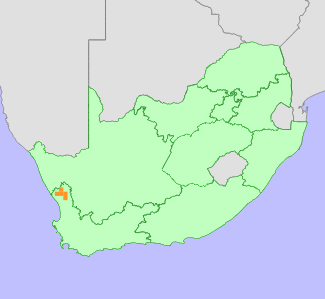|
Scientific Name | Tylecodon occultans (Toelken) Toelken |
Higher Classification | Dicotyledons |
Family | CRASSULACEAE |
Synonyms | Cotyledon occultans Toelken |
National Status |
Status and Criteria | Endangered A4bd |
Assessment Date | 2022/08/02 |
Assessor(s) | N.N. Mhlongo, N.A. Helme & A. Harrower |
Justification | A range-restricted species (extent of occurrence 821 km ²) that now persists in a small area in the Western Cape Province. Its population is declining due to illegal collecting for the specialist succulent trade. The population is suspected to have experienced a 50% decline over a three-generation period (60 years) from 2010-2070. It therefore qualifies as Endangered under criterion A. |
Distribution |
Endemism | South African endemic |
Provincial distribution | Western Cape |
Range | This species is endemic to the Western Cape and occurs from Komkans to Soutrivier and northern Knersvlakte. |
Habitat and Ecology |
Major system | Terrestrial |
Major habitats | Knersvlakte Quartz Vygieveld, Southern Namaqualand Quartzite Klipkoppe Shrubland |
Description | Plants grow on flats and gentle slopes covered with quartz gravel. |
Threats |
| An illegal trade in habitat-collected plants of this species has developed in recent years. The population is declining rapidly as a result of illegal collection with 470 plants included in confiscations between March 2019 and July 2022, many more are likely to have been removed from the wild but not intercepted by law enforcement efforts. |
Population |
This species is known from only a few records, but is minute (only about 10 mm tall when not in flower) and therefore easily overlooked. It is a habitat specialist of quartz fields, and therefore likely to be localized to suitable habitat, but collections note it to be locally common. Based on the number of plants included in confiscations, it is suspected that the population is declining rapidly due to illegal collection. Tylecodon species do not have long-lived seed banks and once a population becomes severely reduced, it would take a long time for them to regenerate the numbers. This makes them much more vulnerable to extinction.
|
Population trend | Decreasing |
Assessment History |
Taxon assessed |
Status and Criteria |
Citation/Red List version | | Tylecodon occultans (Toelken) Toelken | Rare | 2015.1 | | Tylecodon occultans (Toelken) Toelken | Least Concern | Raimondo et al. (2009) | | Tylecodon occultans (Toelken) Toelken | Insufficiently Known | Hilton-Taylor (1996) | |
Bibliography |
Hilton-Taylor, C. 1996. Red data list of southern African plants. Strelitzia 4. South African National Botanical Institute, Pretoria.
Raimondo, D., von Staden, L., Foden, W., Victor, J.E., Helme, N.A., Turner, R.C., Kamundi, D.A. and Manyama, P.A. 2009. Red List of South African Plants. Strelitzia 25. South African National Biodiversity Institute, Pretoria.
Snijman, D.A. 2013. Plants of the Greater Cape Floristic Region 2: The extra Cape flora. Strelitzia 30. South African National Biodiversity Institute, Pretoria.
Tölken, H.R. 1978. New taxa and new combinations in Cotyledon and allied genera. Bothalia 12(3):377-393.
Tölken, H.R. 1985. Crassulaceae. In: O.A. Leistner (ed). Flora of southern Africa 14,1:1-244. Botanical Research Institute, Pretoria.
|
Citation |
| Mhlongo, N.N., Helme, N.A. & Harrower, A. 2022. Tylecodon occultans (Toelken) Toelken. National Assessment: Red List of South African Plants version 2024.1. Accessed on 2026/02/26 |
 Comment on this assessment
Comment on this assessment


